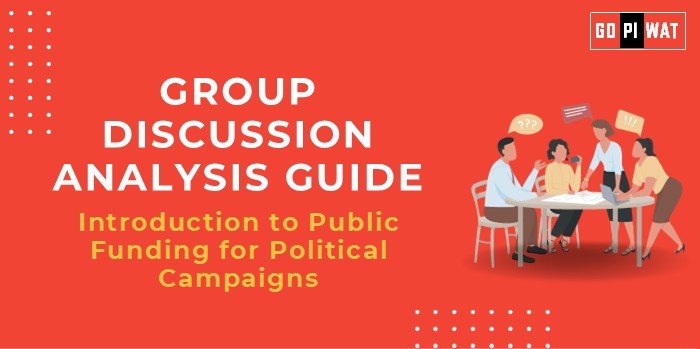📋 Group Discussion (GD) Analysis Guide
🌐 Introduction to Public Funding for Political Campaigns
🌟 Introduction to the Topic
- ⚖️ Opening Context: Globally, political campaigns heavily rely on corporate funding, raising concerns about corporate influence on governance and policy-making. Exploring public funding as a solution has gained traction in many democracies.
- 📜 Topic Background: Public funding for political campaigns seeks to eliminate undue corporate influence, enhance transparency, and level the playing field for candidates. Countries like Germany and Sweden have adopted models of public campaign funding with varying degrees of success.
📊 Quick Facts and Key Statistics
- 💰 Global Spending: In 2020, the U.S. elections saw over $14 billion in campaign spending, a record-breaking amount emphasizing corporate influence.
- 🏛️ Public Funding Models: Germany allocates €150 million annually for party financing, capped by law to ensure fairness.
- 🇮🇳 Indian Context: 80% of political funding in India comes from anonymous sources (ADR, 2023), highlighting the lack of transparency.
- 📊 Public Trust: 63% of voters in a Pew survey believe corporate donations significantly sway policy decisions.
🤝 Stakeholders and Their Roles
- 🏛️ Government: Enacts and enforces laws to regulate campaign funding.
- 📜 Election Commissions: Monitors compliance and ensures transparent use of funds.
- 👥 Political Parties: Adjust to new funding systems and maintain transparency.
- 🗳️ Voters: Benefit from reduced corporate influence on policy decisions.
- 🏢 Corporations and NGOs: Advocate for or against changes in funding models based on interests.
🏆 Achievements and Challenges
✨ Achievements:
- 📈 Improved Transparency: Public funding systems in Nordic countries have minimized reliance on opaque private donations.
- ⚖️ Level Playing Field: Canada’s reimbursement model for campaign expenses promotes fair competition.
- 🌟 Enhanced Voter Trust: New Zealand’s caps on private donations have increased public confidence.
⚠️ Challenges:
- ❌ Funding Adequacy: Ensuring sufficient public funds for campaigns without burdening taxpayers.
- ⚙️ Implementation Barriers: Corruption or misuse of public funds can undermine the system.
- ⚡ Opposition from Stakeholders: Resistance from parties benefiting from corporate funding.
🌎 Global Comparisons:
- ✔️ Successful: Germany and Sweden—robust mechanisms for public funding and caps on donations.
- ❌ Struggling: Brazil—persistent corruption despite public funding reforms.
📖 Case Studies:
Canada’s expense reimbursement approach ensures candidates from diverse backgrounds can compete effectively.
💡 Structured Arguments for Discussion
- ✔️ Supporting Stance: “Public funding reduces the undue influence of corporate donors, ensuring that elected officials prioritize public interests.”
- ✖️ Opposing Stance: “Shifting to public funding might burden taxpayers and lead to inefficiencies in allocation.”
- ⚖️ Balanced Perspective: “While public funding can curb corporate influence, its success depends on robust enforcement and transparency mechanisms.”
🗣️ Effective Discussion Approaches
- 🎯 Opening Approaches:
- 📊 Start with compelling statistics: “In India, 80% of political funding is opaque, highlighting the urgent need for reform.”
- 🌍 Use global examples: “Germany’s public funding model has significantly reduced private influence in politics.”
- 💬 Counter-Argument Handling: Example: “While critics cite taxpayer burden, studies show that public funding strengthens democratic accountability and reduces corruption.”
🔍 Strategic Analysis of Strengths and Weaknesses
- 💪 Strengths: Enhanced transparency, reduced corporate influence, equitable competition.
- ⚡ Weaknesses: Potential misuse, taxpayer burden, resistance from traditional funding beneficiaries.
- 🌟 Opportunities: Boost public trust, modernize campaign systems, set global benchmarks.
- ⚠️ Threats: Corruption, implementation challenges, political pushback.
📚 Connecting with B-School Applications
- 📖 Real-World Applications: Policy design projects, campaign finance reforms, ethical governance studies.
- 🎓 Sample Interview Questions:
- ❓ “How can public funding models ensure efficiency and accountability?”
- ❓ “What lessons can India learn from global campaign finance systems?”
- 💡 Insights for B-School Students:
- Understanding funding’s impact on policy-making.
- Ethical governance and transparency frameworks.
- Balancing economic and political interests.


